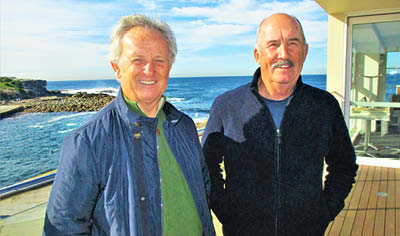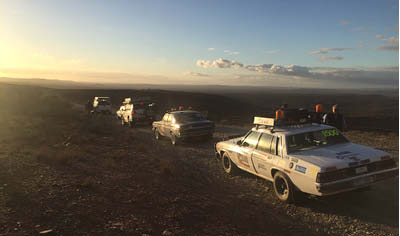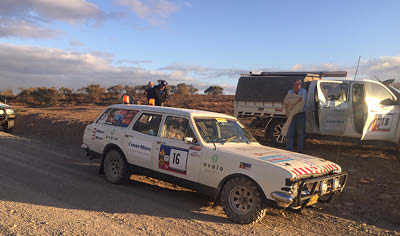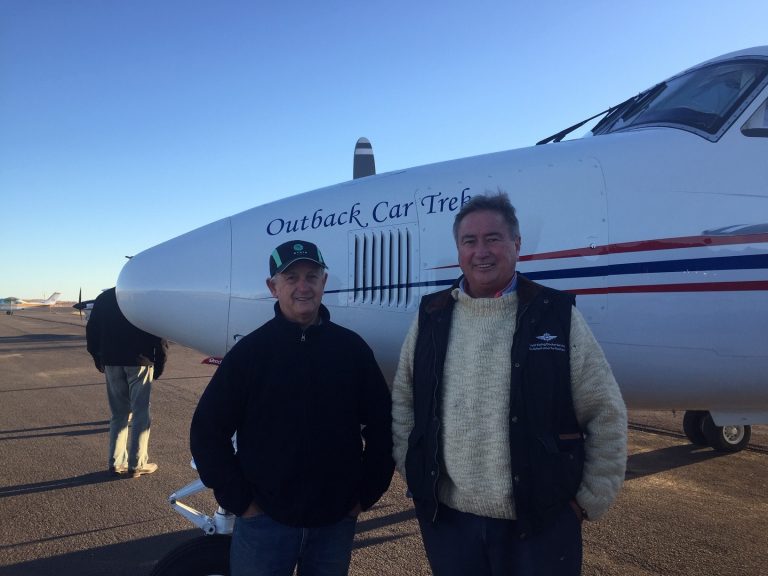JOHN McNAMEE reports on an iconic road event throughout the heart of Australia
The 40-odd kids from the tiny bush community of Boulia, 300km south of Mt Isa, in far north-west Queensland, will be able to have their interstate excursion this year…thanks to the team from the Outback Car Trek.
The teams of drivers, support crew and officials were able to raise $10,000 with a whip-around and raffles during their stay in Boulia as part of their 6,000km epic journey up the heart of Australia in mid-June this year.
The little local school, which caters to many outback properties and indigenous communities has been around since 1891 and its pupils today are from kindergarten to year six. They are already excitedly planning their much-anticipated trip to Adelaide.
The 85-strong convoy of cars, some more than 30 years old, plus 25 support vehicles and 20 official cars were taking part in the 30th Outback Car Trek which over the three decades has raised just on $30m for the Royal Flying Doctor Service (RFDS) and helped buy them several fully equipped aircraft.
But that’s not only what they do….the special fund-raising effort at the so-called “Channel Country” hamlet of Boulia, 400km north of Birdsville, is just one of the many times the crew pass the hat around and dig in to help out struggling isolated communities during their rugged two-week trek from Renmark in South Australia to Vestey’s Beach in Darwin..

“There’s about 250 to 300 of us in the trek over the whole period of the event and we bring a lot of support to outback towns, which is our way of helping them,” said Mike Wheatley, a veteran of all 30 outback car treks.
“Again this year we have raised about $1.5m for the RFDS and we were pleased to see that they have named one of their state-of-the-art Beechcraft King Air planes The Outback Car Trek,” Mike told Go55s.
“The Outback Car Trek is the principle private sponsor of the RFDS and jt’s our way of showing how much we appreciate the service provided to outback communities by these dedicated people,” Mike said.
The RFDS covers an almost eight million kilometre area with its crucial emergency care services.
There was no better demonstration of this in the early stages of the trek when one of the support drivers, aged in his 60s, had a seizure in the early hours of the morning during the stopover at Bunker Hill in the Flinders Ranges national park in South Australia.
Mike’s co-driver and 11-trek veteran Digby Warren explains: “We had to make an emergency call to the RFDS because we knew that our mate needed urgent medical attention.
“The aircraft arrived and was able to land at a nearby strip and within a few hours the patient was in the Intensive Care ward at Adelaide Hospital, and we’re pleased to say he made a full recovery…and it’s thanks to the RFDS,” Digby told Go55s.

“Actually it’s not the first time that the RFDS has been called to an emergency on one of our treks but they have mainly been medical episodes and not serious motor vehicle incidents.
“All of the cars taking part have to undergo a rigorous safety test before they’re allowed to participate in the event and all have to have special reinforcing such as roll cages, bucket seats with full harness safety belts and extra lights.
“Of course there have been many prangs and roll-overs along the way during the 30 years of the trek but there have been no serious injuries, thanks to those safety regulations,” he said.
The car driven by the team of Mike Wheatley and Digby Warren with support from Rob Blain is an impeccably restored 1969 Holden HT wagon powered by a five speed, six-cylinder Supra (Celica) gear box with an enlarged radiator to prevent boilovers and a strengthened front end.
“I first got interested in these sort of cars about 40 years ago when Rob and I, who were both working in real estate, bought a wrecked 1964 Ford Falcon station wagon for $400, and spent a couple of grand fitting it up with roll bars, welding the back doors, taking the roof off and turning it into a convertible,” Mike said.
“I took part in the first outback car trek in 1990 which went from Sydney, Cobar, Birdsville, Collinsville to Hamilton Island.
“And since then I’ve been in every one which takes a different route each year. We’ve driven across some of the most iconic landscapes in Australia and I can tell you there’s very few places in the world that can compare with the beauty and the breathtaking ruggedness,” Mike said.
“And in the outback the sunsets and sunrises are more spectacular than anywhere else,” he says.
This year’s route went from Renmark to the Barossa Valley, through the Flinders Ranges, Rawnsley Park Station to Marree, Birdsville to Boulia, Mt Isa, Hells Gate to Lorella Springs, Mataranka to Jabiru, and on to Darwin.
“We take it in turns to drive the 500km legs, 250km each, and all the cars are UHF two-way radio equipped and any breakdown is quickly attended to by the magnificent support crew,” Digby said.
All the vehicles wishing to take part in the event, which is mainly for older 2WD cars, have to raise at least $7,500 for the charity… some raise even more.
One of the worst perils faced by the drivers are the deeply rutted and corrugated bush tracks in the Channel Country, north of Birdsville.
“It’s basically 500km of rutted roads, some of the rivers have occasionally be swollen so we have to make detours of often several hundred kilometres and it takes a heavy toll on the cars, particularly the older vehicles like ours,” Mike said.

“On one occasion we were negotiating this pretty bumpy stretch when we felt a horrible shock at the front of the car and the next thing I saw was a wheel from the front stub axle cartwheeling along in front of us with the brake drum still attached.
“I tell you what it was pretty scary trying to steer with only one front wheel and no brakes,” Mike laughs.
This year the crews were lucky with tolerable daytime temperatures although at night, the thermometer often dropped to below one degree.
Mike, a hotel broker, and Digby, a prominent travel agency director, are both aged in their early 70s but say the event is open to all age groups and all types of 4WDs as long as they conform to the strict safety standards.
The organisers stress that the event is not a race otherwise the vehicles would have to be of a different standard of construction and the drivers and support crew are given valuable pre-event information stressing the areas where caution is needed.
“The trek organisers do a great job in mapping out the routes and providing information on the local accommodations available and there are strict rules governing behaviour throughout especially on any private land that may be crossed,” said Mike.
“But you can be sure at the end of the day when we pull into an outback community and get welcomed by the locals, there’s nothing like a good hot shower and a barbecue and maybe a cold beer to wash the dust away,” laughs Digby.
Any information on the event can be obtained from the website outbackcartrek.com.au and anyone wishing to make donations to the Royal Flying Doctor Service can contact Mike Wheatley at mike.wheatley@knightfrank.com




